FINLANDIA
HALL 1980
an interview with Finlands great jazz-rock music maestro
PEKKA POHJOLA
interview written by Robert Silverstein
An
instrumental rock legend who brought so much joy to the hearts and
minds of music lovers worldwide, Pekka Pohjola sadly passed away on
November 27, 2008. Though not without precedent, Pekka’s passing
away at the close to young age of 56 leaves a gaping hole in the symphonic
rock world. We will not soon see a pioneering musical genius the likes
of him again and he’s already sorely missed. The following interview
with Pekka Pohjola was the first interview I ever wrote and conducted
and had published. It first appeared in an early 1981 issue of Eurock
magazine. The article was titled “A Visitation With Pekka Pohjola.”
I almost remember typing it all out on my high tech typewriter! What
a thrill it was for me, then 26 years old back in the Summer of 1980
to travel to Finland and meet, speak with and interview Pekka. Here
is that verbatim transcript of my one on one interview with Pekka
Pohjola from that fabled Summer of 1980.
-----------------------------------------------------------------------------------------------------------------------------------
A
VISITATION WITH PEKKA POHJOLA
Finlandia Hall 1980
by Robert Silverstein
Last summer I had the unique opportunity to interview one of the finest
musician-composers alive today. I found Pekka Pohjola to be in good
spirits, rehearsing at Finlandia Hall with a jazz orchestra for the
1980 Nordring Festival, presenting a fascinating show bringing the
history and music of Finland up to date from about the turn of the
century. Although he wasn’t playing his music, and was just doing
session work, Pekka, playing his Fender jazz bass was flanked by Finnish
jazz luminaries such as Olli Ahvenlahti, Juhani Aaltonen, Eero Koivistoinen,
and for a special segment dealing with traveling to exotic places,
guitar great Jukka Tolonen was called in to deliver a sterling performance
of his tune from a few years back, “A Passenger To Paramaribo”
- strings and all. It was after one of the many rehearsals of this
engaging musical display that I had the pleasure to interview Pekka
Pohjola.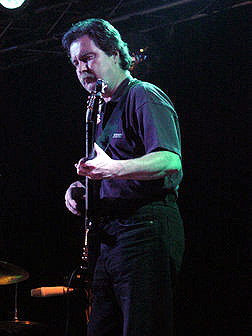
Time: August 1980
Place: Finlandia Hall, Helsinki Finland
Subject: an interview with Pekka Pohjola
ROBERT SILVERSTEIN: Can you remember the first composer that interested
you?
PEKKA POHJOLA: Well, that’s a hard question because I used to
listen to a lot of classical music when I was young and had gotten
into music already, then. So, it must have been any of the great names—Beethoven,
Mozart, Sibelius... Afterwards I became interested in rock and roll
music by The Beatles. Before that I used to think that rock and roll
was shit.
RS: What was your first musical instrument?
PEKKA: The first instrument I played was the piano, without a teacher.
Only after I started the violin did I have a teacher at age eight.
RS: Are there any other musicians in your family?
PEKKA: Yeah, everybody. It’s kind of a musical family. My father,
his two brothers and one sister are quite famous here. My father is
a choir conductor and cellist as well. My uncle is a famous music
teacher and has a children’s choir and orchestra. They have won
competitions abroad.
RS: What was your first band like?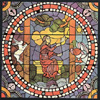
PEKKA: Well, my first band...it was not really a band. I used to play
with a good friend of mine, a guitar player called Matti Kurkinen.
He later played in a group called Kalevala, now he’s dead. He
died in a car accident. We did all these Beatles tunes as well as
our own tunes. I might have some tapes of it but I don’t know
where they are. Let’s say we were 14 or 15 at the time.
RS: What makes Scandinavia such an inspirational place for music?
PEKKA: Well, I might ask the same thing from you. Why is the States
such an inspirational place for music? Well, I guess every place has
it’s own identity. And if it’s brought out in an interesting
way then it maybe seems, what’s the word... exotic to the other
nations. If its made well it should sound strange.
RS: What was it like here in Finland in the mid 1960’s?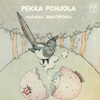
PEKKA: Well, The Beatles came and everybody had long hair. New guitar
bands started out, things like that. Then it went a bit on and became
better, because it was a very English rock type influence for a long
time and then all this American jazz, soul and funk music came.
RS: Who were you listening to then?
PEKKA: Only The Beatles, nothing else. I knew some tunes from the
radio but I only listened to The Beatles.
RS: How did you come to join Wigwam?
PEKKA: Well, actually I wasn’t very familiar with them. When
I was 17 I used to play in a band called Jussi And The Boys for half
a year and then...they asked me to join the band, Wigwam. Because
the original bass player, Mats Huldén started to study and
he couldn’t make all the gigs. So they thought they’d hire
two bass players and I would play the violin as well, but I didn’t.
RS: “1936 Lost In The Snow” was your first composition in
Wigwam. How did that strange title come about?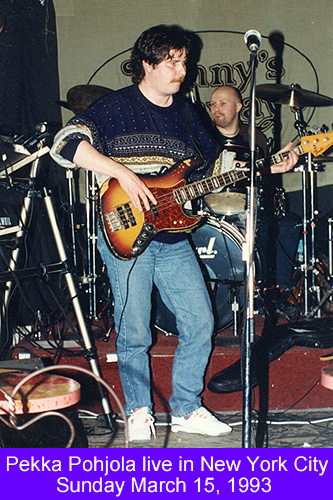
PEKKA: Actually, I haven’t made any titles yet. All the titles
of my tunes are made by someone else. It’s very hard for me to
get the atmosphere. I think it was Kim Fowley who came up with the
title for “1936.” Different people come up with names.
RS: In Wigwam, who’s music was featured live the most?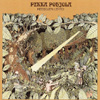
PEKKA: It was Procol Harum and The Band, with very few of our own
tunes. It was strange... In Wigwam’s music, we’d record
our own tunes, but never played them live. Just a few tunes of our
own were played live.
RS: At what point do you feel Wigwam was most together?
PEKKA: In the middle of it, after two years. I’d played in Wigwam
for four years. After two years the feelings went down. This was after
Fairyport.
RS: Was there any outside political influences in Wigwam, especially
behind the band’s album Being...?
PEKKA: There was no politics. There was very much idealism. Nobody
was a communist, left or right wing. I think Jukka (Gustavson) was
putting down politics.
RS: Who had the most influence on Wigwam’s recorded works?
PEKKA: Well, I think it was separate. Jim (Pembroke) had his own tunes,
and Jukka was very strong on his side, and I was somewhere in the
middle. I never really got into planning the records. If there were
two tunes missing I would write them.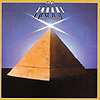 It was always Jukka planning “all things.” His lyrics were
translated to English by Mats Huldén and of course Jim had
his English lyrics too. It was very strange Finnish so it must be
strange English. (laughter)
It was always Jukka planning “all things.” His lyrics were
translated to English by Mats Huldén and of course Jim had
his English lyrics too. It was very strange Finnish so it must be
strange English. (laughter)
RS: When did you realize that your music was not direction of the
group’s?
PEKKA: Well... we did one tune called “Nipystys” with Wigwam
and that showed me it wasn’t the right group for that kind of
music. I mean...it still hasn’t been played right. It’s
being played by our new group and it sounds better.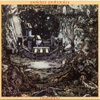
RS: What do you think of Jim Pembroke’s music?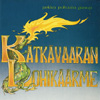
PEKKA: I think it’s great, he has some really good tunes. It
was the influence from Gary Brooker and the Band’s music which
gave him the orchestral feelings at first. Of course his music has
an amazing sense of his unique identity.
RS: Your first 1972 solo album Pihkasilmä Kaarnakorva seemed
to be overflowing with musical themes. How did that fit with what
Wigwam was doing then?
PEKKA: No way, it was just completely something else. I wanted to
do something on my own. I used only Jukka from Wigwam. I wasn’t
doing any solo concerts yet at the time, just composing at home. I
didn’t dare to bring out the tunes. It’s very hard in the
beginning...like when your first song is being played you say, ‘is
this my tune?’ (laughter)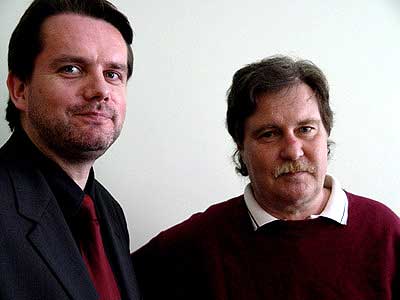
RS: Your second album, B The Magpie was released by Virgin
Records in England around the same time as Wigwam’s Nuclear
Niteclub. Was there some joint effort by Love and Virgin Records
to give you and Wigwam some sort of international exposure.
PEKKA: Yeah, I guess that’s the way it was. I think they met
at some festival, the Virgin people and the Love people, and they
exchanged records, the way record company people do and they liked
Wigwam and my music.
RS: Have you done any solo gigs with anyone in England?
PEKKA: No.
RS: In that it was a concept album, was B The Magpie played
live in its entirety?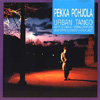
PEKKA: No, it was played in bits. And it was a very short time to
record it. We had only four days in the studio.
RS: How did you and Mike Oldfield come to collaborate together on
your third solo album from 1977, Mathematician’s Air Display...?
PEKKA: At the time, Virgin Records had B The Magpie. Also,
Mike had a copy of it and thought it was kind of his music, same kind
of music. At the same time he was a bit depressed because the second
album he made, Hergest Ridge was not accepted by the press...
And he was just alone in his big country house. So, the Virgin people
tried to find people to play with him, and he liked my album. So,
they flew me over, also Pierre Moerlin. First we did our own tapes,
nothing for the record. The second time I flew over we started to
make tunes, and one of them “Mathematician’s Air Display”
we felt was so good it could it could be released on a record. At
the same time I was doing my own solo album in Sweden with the group
Made In Sweden backing me. So I took the background tapes to Mike’s
studio at Gloucestershire and we put the music together. That’s
the way.
RS: I heard that album won some kind of award in Finland.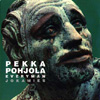
PEKKA: Yeah, the radio people here chose it as the record of the year
on the rock side. It won a jazz award, also classical. A series of
awards.
RS: Could you tell me a little about the group Made In Sweden?
PEKKA: Well, it was George Wadenius and Wlodek Gulgowski. They were
a bit tired of what they were doing in New York and George was missing
his homeland, Sweden. They thought that they could come here and build
a band. And they tried to find the right musicians. They went around,
met Vesa Aaltonen and me and they liked it enough so we joined the
group. In the beginning it was very nice. But also after, the singer
Tommy Körberg left it started to go really down because we didn’t
know what we should do next. The record company wanted us to find
a new singer but it was nearly impossible to find one as good as Tommy.
And it was impossible. So we went on as an instrumental group, but
that didn’t satisfy the record company. It went down after two
years.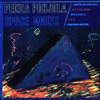
RS: Did you compose for the group or play live with them?
PEKKA: Some, yes. We did the composing together. We did many gigs
but only one album together called Where Do We Begin?
RS: How soon after your third solo record did you form The Group?
PEKKA: Let’s see... Before Made In Sweden I played half a year
in Jukka Tolonen’s Band. And a half a year after Made In Sweden
we formed The Group.
RS: Was The Group basically your musical sound that later emerged
more realized on your 1979 Visitation Lp release?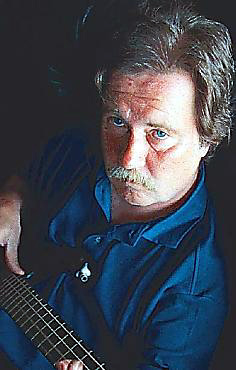
PEKKA: The Group’s music wasn’t really my music. I did many
of the themes but the construction of the music was put together with
Olli Ahvenlahti and the rest of the band. I don’t really like
to call it my music. It’s like a mixture of the whole thing.
It was very simple...some tunes were very simple. And some hit tunes,
or we thought of it like that.
RS: Visitation is a perfectly balanced album of jazz-rock and
classical music. Are you still happy with it?
PEKKA: Well, in a way I am. Always, you want to do everything better.
But it’s played well, the sound is quite good. Yeah, I think
I’m happy, as happy as you can be after making an album. You
always want to do something better, afterwards.
RS: Do any particular tracks really stand out on stage?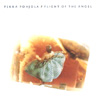
PEKKA: From Visitation? We just play “Vapour Trails”
and “Dancing In The Dark.” Some tunes, the ones with orchestration
like “Image Of A Passing Smile” are very hard to play with
two guitars and keyboard.
RS: Of the musicians on that album, who’s still in your new band,
the Pekka Pohjola Group?
PEKKA: Just Seppo Tyni. On keyboards is Seppo’s brother Pekka.
The drummer is new too. His name is Ismo Kätkä. Our new
album is called Kätkävaaran Lohikäärme.
It means the dragon of Lohikaarme.
RS: Could you tell us what it sounds like?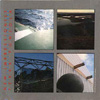
PEKKA: I’m not going to tell you! (laughter) Wait and see.
Special thanks to Pekka Pohjola @ www.Rockadillo.fi/PekkaPohjola
for his friendship during my visits to Finland in the ‘70s and
‘80s. Also many thanks to Emu Lehtinen for his hospitality. Emu’s
famous jazz / rock Lp / CD store Digelius
Music remains a shrine to the brilliant musical heritage of the
Finnish people. This article / interview is dedicated to the memory
of two great men - Pekka Pohjola and my father Arnold Silverstein.


